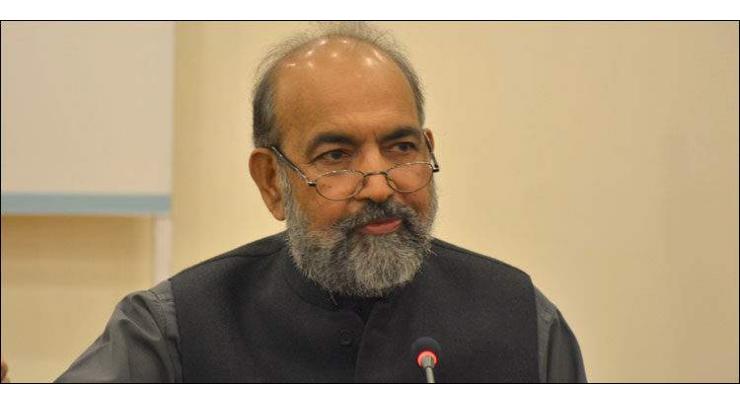
Hindu Temple Cannot Be Constructed With Public Money: CII
Mohammad Ali (@ChaudhryMAli88) Published October 28, 2020 | 09:56 PM

The Council of Islamic Ideology (CII) Chairman Dr Qibla Ayaz on Wednesday said there was no such tradition of constructing religious worship place with public money so the Hindu temple could not be constructed with public money in the federal capital
ISLAMABAD, (UrduPoint / Pakistan Point News - 28th Oct, 2020 ) :The Council of Islamic Ideology (CII) Chairman Dr Qibla Ayaz on Wednesday said there was no such tradition of constructing religious worship place with public money so the Hindu temple could not be constructed with public money in the Federal capital.
Briefing media about the recommendations of three-day meeting of CII held from October 26 to 28, he said the CII had recommended establishing a 'Special Welfare Fund' for minorities with freedom to spend in accordance with their choice.
The construction of Hindu temple was referred to CII for recommendations. The CII has contended that Hindu temple should not be built in the federal capital from the state's exchequer as there was no tradition of constructing private worship places with public money.
Qibla Ayaz said the CII had recommended opening old temple and adjacent Dharamshala (an Indian Resthouse or Hostel built with religious purpose) in Saidpur village to enable Hindu community to perform their religious rituals in the federal capital.
The Constitution provides right to all citizens to practice their religion freely and perform last rituals of deceased members of their community in accordance with their religious belief. Hindu community was allowed to perform last rituals of a deceased person in Shamshan Ghat (a mortuary where corpses are cremated).
The CII contended that the Hindu community was allowed to construct a community centre for performing their religious rituals and marriage ceremonies and there was no harm in it as per Sharia.
The CII suggested amending Evacuee Trust Property board Act and allowing minorities to fulfill their religious needs in case of increase in population. The facilities should be provided to Hindu temples and others in Pakistan in accordance with Liaquat-Nehro pact, said the chairman.
The CII recommended promulgating Dastur-ul- Amal Diwaini Kalat 1952 in entire Balochistan, making mandatory the adoption of urdu as official language in government institutions including courts.
The CII approved Pakistan Penal Code (Amendment) Bill 2020 moved by MNA Shazia Mari with some amendment.
The CII okayed Penal Code (Amendment) Bill 2019 regarding the capital punishment declaring that the bill was in line with the provision of the Sharia.
The CII condemned blasphemy of sacred religious personalities, saying that the council also recommended amending Article 37 related to permit of liquor to non Muslims.
The CII said Bahai community had its separate recognition. There was no harm in adding separate column for Bahai community members in birth and death certificates.
The council recommended restoring old Nikkah registration system as this could increase problems of the people.
The issue of forced conversion was under consideration in the council, Qibla Ayaz said adding that the members of CII would visit the vulnerable areas of Sindh and Punjab and decide about forced conversion after evaluating ground realities.
The council approved draft anti witchcraft bill which will be presented in the parliament for final approval.
The forum approved comprehensive suggestions for making Nizam-e-Zakat (Zakat System) in accordance with the provisions of islam. The suggestions will be sent to Ministry of Religious Affairs and Interfaith Harmony for implementation.
The CII expressed some reservations over 'Domestic Violence Bill' and decided to prepare a comprehensive draft ovet it.
The council contented that the medicine prepared with 'Haram' items could be used, if no alternate was available.
The council approved comprehensive recommendations over Hajj funds and Hajj system on the request of Ministry of Religious Affairs and Interfaith Harmony.
Related Topics
Recent Stories

Robinson, bowlers help New Zealand go 2-1 up against Pakistan

Shahzeb Chachar to hold khuli kachehri on April 26

Heatwave amid Israel's aggression in Gaza brings new misery, disease risk

Tourism must change, mayor says as Venice launches entry fee

Court adjourns Judicial Complex attack case till May 17

Nasreen Noori’s book ‘Popatan Jahra Khwab’ launched

Wafaqi Mohtasib inspection team visits Excise and taxation office

AJLAC announces 5th Conference titled ‘People’s Mandate: Safeguarding Civil ..

Pak-US officials engage to enhance trade, investment ties

IBCC to promote educational excellence, expand regional presence

Pakistani 'Blue Helmets' serving UN Peacekeeping Mission in DR Congo set to leav ..

Putin says plans to visit China in May
More Stories From Pakistan
-
Naval Chief participates in 19th Western Pacific Naval Symposium in China
4 hours ago -
Int'l symposium addresses capacity building for safe, environmentally sound ship recycling in Pakist ..
4 hours ago -

Shahzeb Chachar to hold khuli kachehri on April 26
4 hours ago -

Court adjourns Judicial Complex attack case till May 17
4 hours ago -

Nasreen Noori’s book ‘Popatan Jahra Khwab’ launched
5 hours ago -

Wafaqi Mohtasib inspection team visits Excise and taxation office
5 hours ago
-

AJLAC announces 5th Conference titled ‘People’s Mandate: Safeguarding Civil Rights in South Asia ..
5 hours ago -

IBCC to promote educational excellence, expand regional presence
5 hours ago -

Pakistan embassy organizes scholarship award ceremony in Kathmandu
5 hours ago -

SC to hear case pertaining IHC judges' letter on April 30
5 hours ago -

SC orders removal of barriers outside buildings in Karachi
5 hours ago -

PFA launches crackdown, impose fine for selling expired drinks, food items
5 hours ago









